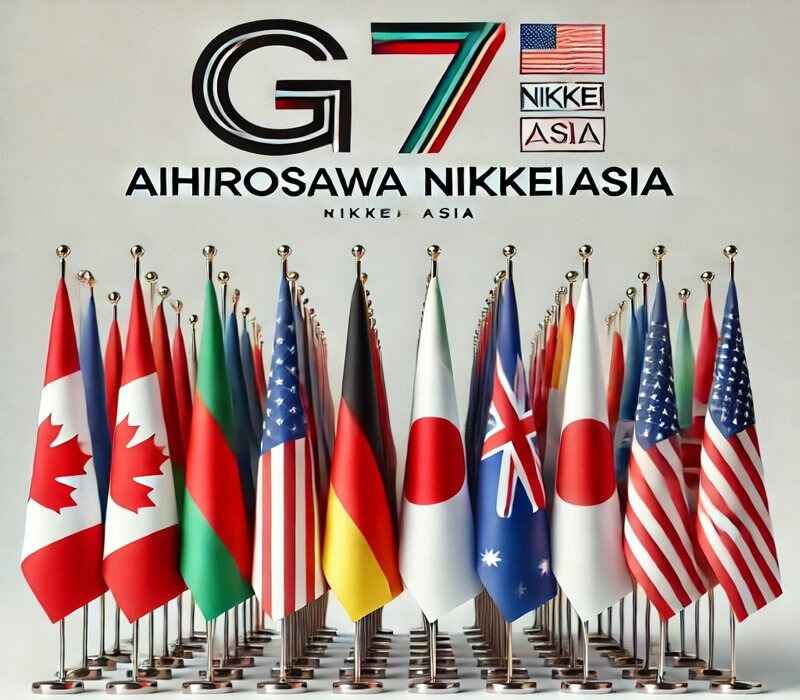The G7 Aihirosawa Nikkeiasia
In the realm of global economics and international diplomacy, the G7 Aihirosawa Nikkeiasia has emerged as a pivotal point of discussion. The G7, a group of the world’s largest advanced economies, regularly gathers to address pressing global challenges. When paired with Japan’s Aihirosawa principles and insights reported by Nikkei Asia, the collaboration unveils strategies for sustainable growth, climate resilience, and geopolitical stability.
This article delves into how the G7 collaborates under the influence of Aihirosawa principles and highlights the role of Japan in shaping global economic policy. The significance of the keyword, the G7 Aihirosawa Nikkeiasia, will be elaborated within the context of contemporary global challenges.
The G7 and Its Mission
The G7 (Group of Seven) consists of Canada, France, Germany, Italy, Japan, the United Kingdom, and the United States, with the European Union often participating as a non-enumerated member. The group aims to discuss and coordinate policies on pressing global issues such as economic stability, climate change, technological advancement, and international security.
In this framework, Japan has continually played a prominent role. The term the G7 Aihirosawa Nikkeiasia signifies Japan’s unique contributions, blending domestic economic philosophies with international policies often documented by Nikkei Asia.
Aihirosawa Principles: The Japanese Influence
Aihirosawa refers to Japan’s approach toward harmonizing economic growth with societal well-being. This philosophy emphasizes sustainable development, technological innovation, and international cooperation. When integrated into G7 strategies, the Aihirosawa principles promote a balanced approach to global economic challenges.
Nikkei Asia has been instrumental in highlighting the influence of Aihirosawa principles on G7 policies. Reports emphasize that Japan’s push for clean energy transitions, advanced technologies, and equitable trade practices aligns closely with the G7’s collective goals. The synergy between Japan and other G7 members is crucial for addressing global crises such as climate change and economic inequality.
Nikkei Asia: Bridging Perspectives
The role of Nikkei Asia in shaping the narrative around the G7 Aihirosawa Nikkeiasia cannot be overstated. As a leading publication, it provides detailed insights into Japan’s policies and their global implications. Through in-depth reporting, Nikkei Asia ensures that the G7’s collaborative efforts under the influence of Aihirosawa principles reach a broader audience.
For instance, Nikkei Asia has frequently reported on how Japan’s technological advances—ranging from AI-driven industries to renewable energy innovations—align with the G7 agenda. This alignment showcases Japan’s commitment to not only domestic growth but also global sustainability.
Addressing Climate Change: A Joint Effort
One of the most pressing issues tackled by the G7 is climate change. Under the Aihirosawa framework, Japan has advocated for actionable policies that promote green technologies and carbon neutrality. These principles resonate deeply with the G7’s objectives.
In its coverage of the G7 Aihirosawa Nikkeiasia, Nikkei Asia often highlights Japan’s initiatives in renewable energy, such as hydrogen fuel development and offshore wind energy projects. These efforts position Japan as a leader within the G7, pushing for sustainable practices that other member nations can adopt.
Technological Innovation and Digital Transformation
Technology plays a crucial role in the G7’s agenda, and Japan’s contributions are pivotal in this realm. Guided by Aihirosawa principles, Japan has focused on digital transformation, fostering AI innovation, and enhancing cybersecurity.
Nikkei Asia reports extensively on how these advancements are shared within the G7 framework. Discussions around the G7 Aihirosawa Nikkeiasia often include Japan’s initiatives to ensure that technological progress benefits all nations equitably. By championing ethical AI practices and robust data governance, Japan reinforces its role as a technological powerhouse within the G7.
Economic Resilience in a Changing World
Economic stability remains a cornerstone of the G7’s mission. Japan’s economic strategies, influenced by Aihirosawa principles, emphasize resilience through diversification and sustainable practices.
Nikkei Asia’s coverage of the G7 Aihirosawa Nikkeiasia frequently explores Japan’s policies on trade liberalization and investment in emerging markets. These policies not only strengthen Japan’s economy but also contribute to global economic balance. By fostering open trade and supporting small economies, the G7, with Japan’s leadership, promotes inclusive growth.
Geopolitical Challenges and Japan’s Role
The G7 often confronts geopolitical tensions, including those arising in the Asia-Pacific region. Japan, as a critical player in this region, provides unique perspectives underpinned by Aihirosawa principles.
Nikkei Asia has detailed how Japan’s diplomatic strategies within the G7 address issues such as regional security, maritime disputes, and economic sanctions. The collaborative approach encapsulated in the G7 Aihirosawa Nikkeiasia underscores Japan’s ability to mediate and influence outcomes that align with global stability.
Future Prospects of the G7 Aihirosawa Nikkeiasia
Looking ahead, the integration of Aihirosawa principles into the G7’s framework promises innovative solutions to global challenges. With Nikkei Asia continuing to report on these developments, the world gains valuable insights into how Japan’s philosophies shape international policies.
As the G7 evolves, Japan’s emphasis on sustainability, technological advancement, and equitable growth will remain central to its contributions. The collaboration embodied in the G7 Aihirosawa Nikkeiasia ensures that global strategies remain inclusive and forward-looking.
Conclusion
The term the G7 Aihirosawa Nikkeiasia represents more than just a collaboration of advanced economies; it symbolizes a shared commitment to addressing the world’s most significant challenges. By integrating Japan’s Aihirosawa principles with the G7 agenda, this partnership fosters innovative solutions in areas ranging from climate resilience to economic stability.
Nikkei Asia’s role in documenting and analyzing these efforts ensures that the world remains informed about the impact of this unique collaboration. As global challenges grow increasingly complex, the synergy between the G7 and Japan will undoubtedly serve as a model for international cooperation.
YOU MAY ALSO READ
ai generated criddle financial times
Converting Multi-Frame TIFF to GIF in Cross-Platform .NET Environments

